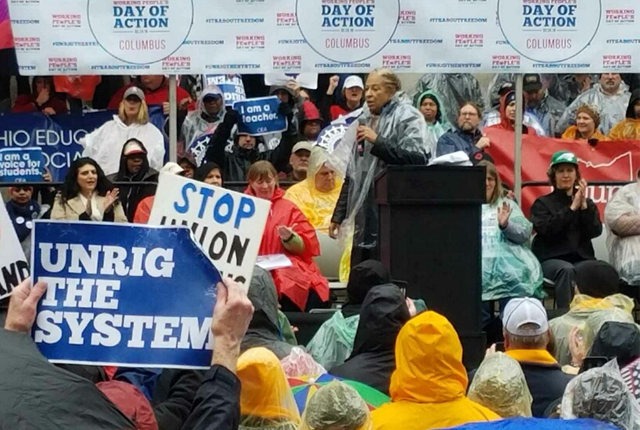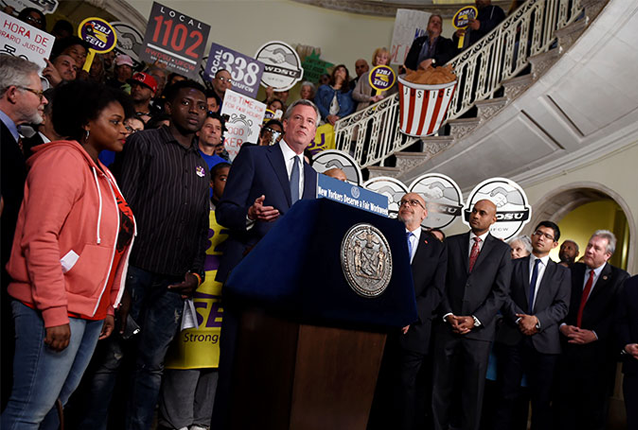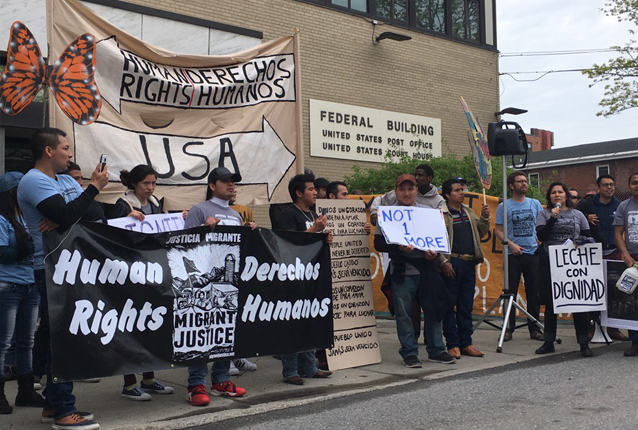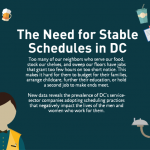Yesterday, as expected, D.C. Mayor Vincent Gray vetoed the Large Retailer Accountability Act. But the fight to prevent poverty wages in the District is far from over. On Tuesday, the City Council will vote to override the mayor’s veto. All we need is one vote from Tommy Wells to guarantee living wages from the world’s most profitable retailers in the District.
This is the final push. Email Tommy Wells NOW and tell him to stand with working families in the District – not outside corporations.
Don’t live in D.C.? Spread the word to your friends and family in the District.
Following Mayor Vincent Gray’s veto of landmark legislation that would require D.C.’s big box retailers to pay workers a living wage of $12.50 an hour, Jobs with Justice and American Rights at Work have launched a city-wide effort to urge key members of the D.C. City Council to join other council members in voting to overturn the veto of the Large Retailer Accountability Act of 2013.
The bill, which would raise working standards for thousands of retail workers at profitable big box stores, could set a national precedent. Locally, where much of the city qualifies as the “working poor,” the bill will go a long way toward helping retail workers earn a stable income that allows them to effectively support a family as well as to reinvest their earnings in the District’s economy.
Despite the veto, and repeated threats from Walmart and its corporate lobbyists, community activists are refusing to back down from this key opportunity to stand up for D.C.’s working families.
“We’re looking at council members like Tommy Wells, a longtime champion for working families, to do the right thing and guarantee decent wages for D.C.’s retail workers,” said Sarita Gupta, executive director of Jobs with Justice and American Rights at Work. “If Wells truly supports workers, then it’s time he helps them achieve true economic security by voting to override this veto.”
Continued Gupta, “We all do better when we all do better—and Washington, D.C., deserves better than employers who don’t respect the community. This bill would have positive ripple effects across the entire District economy, because studies have shown that low-wage workers are more likely to spend extra money on local goods and services.”
The organization’s local affiliate, DC Jobs with Justice, has worked for nearly a decade to promote living wages and community standards in the District; the group’s Living Wages, Healthy Communities coalition later developed into the Respect DC campaign to hold Walmart accountable to the community. Following Walmart’s announcement to open six D.C. locations, DC Jobs with Justice mobilized residents to call for a responsible development plan to lift community standards, similar to campaigns run previously by Jobs with Justice coalitions in New York City, San Francisco, and. Respect DC spent years asking Walmart to voluntarily negotiate a binding agreement with community and faith leaders to guarantee decent working standards, but the company refused to respond.
“Gray’s veto is a disappointment, but the D.C. community isn’t going to be bullied by Walmart’s greedy corporate agenda,” said Reverend Graylan Hagler, pastor at Plymouth United Congregational Church of Christ, Ward 4 resident, and member of the Respect DC coalition. “There are stores already operating successfully in our city who pay a living wage. At a time when many D.C. residents are being displaced by rising costs and a lack of good jobs, this bill a clear message that D.C. residents believe everyone deserves to be paid a wage that allows them to afford to live in our city, and shop in the stores they work in.”
A November 2005 American Rights at Work report, Walmart: Rolling back workers’ wages, rights and the American Dream, detailed Walmart’s impact on workers and their communities, saying:
“When Walmart plunges into an area, it doesn’t simply co-exist with existing businesses and eat from a larger retail pie. Walmart moves in and replaces good jobs with its own jobs that pay less, have fewer benefits, and are without union representation.”
D.C.’s living wage battle is just one of many happening nationally. Several years ago in Chicago, a similar living wage ordinance was passed for big box retailers, requiring stores with more than $1 billion in annual sales to pay a minimum of $10 per hour plus an additional $3 in fringe benefits. Walmart threatened to stop all efforts to build in Chicago if the ordinance passed, prompting then-Mayor Richard Daley to veto the bill, creating disastrous consequences that are still being felt today. A study conducted by David Merriman, associate director of the Institute of Government and Public Affairs and a professor in the Department of Public Administration at the University of Illinois at Chicago, and Joseph J. Persky, a professor of economics at the university, painted a startling picture, finding:
“Based on the disproportionate number of business closures close to Walmart, we concluded that, after two years, the number of jobs lost by Walmart’s nearby retail competitors essentially offset the number of jobs created at the new Walmart.”
“When Walmart was first exploring plans for D.C. expansion, they courted city legislators by promising to pay $13 an hour. Now, they’re claiming $12.50 is too high,” Gupta went on to say. “It’s time our City Council represents the interests of the D.C. community and asks some of the city’s largest employers to do right by the customers and workers who keep them in business.”




